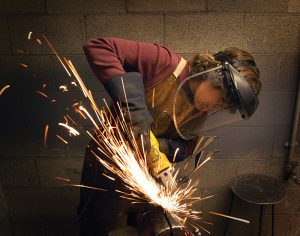
Manufacturing is resurging in the Rogue Valley, but industry is having a hard time finding skilled workers to fill key jobs.
To help meet that need, RCC is gearing up its industrial technology trainings with a focus on high-demand jobs.
Steven Foster, chair of RCC’s Manufacturing Engineering Technology Department, has observed an upsurge in manufacturing in the Rogue Valley from small to medium to larger companies that produce firearms, electronics, and aviation productions.
“Quality control is a big issue for the return to American products,” he said.
Taking into account fuel, labor, and transportation, some analysts predict that as soon as 2015, it will cost about the same to manufacture goods for the American market in certain parts of America as in China in many industries, including computers and electronics, machinery, appliances, electrical equipment and furniture.
The college is assembling a range of classes into short training series designed to prepare students for jobs in various manufacturing sites. Upon completion, grads will earn a one-year Career Pathways certificate of completion.
“Our goal is to provide work-ready employees,” said Tom Miller, interim dean of RCC’s School of Science and Technology. “RCC is bundling already existing classes from a number of our programs including welding, manufacturing, and diesel technology.”
Students also will gain basic math and writing skills, Miller said. The courses and resulting certificate of completion can be applied to many manufacturing industries including food processing, aircraft construction and timber products.
“For example, southern Oregon lumber mills are having trouble finding workers with technical competence,” Miller said. “That problem is made worse by the fact that many millwrights and mechanics are retiring. Also local high schools have curtailed their technical/shop programs,” he added.
“Industry really needs these people, and the jobs should pay $18-20 an hour. Their skills are highly valued,” Miller said. Potentially, the training could serve as an entry point into RCC’s millwright apprentice program.
Industry input also inspired RCC to work with industry partners to provide a flexible technology lab, possibly at RCC’s Table Rock Campus in White City.
A $500,000 state matching grant will be used to develop the flex tech lab. The lab would have high-bay shop spaces with moveable walls that would allow quick reconfiguration for different types of training. The lab’s design also would make it easier to add new programs as demand arises.
“This facility will allow RCC to work with regional employers to determine exactly the right training for the right people at the right time,” said RCC President Peter Angstadt.
